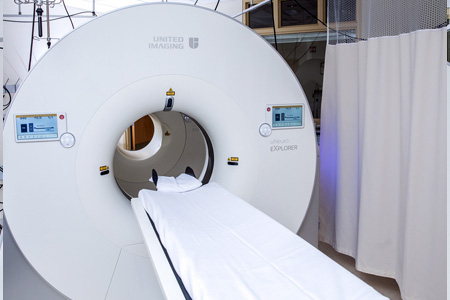Yale School of Medicine (YSM) announces the launch of the Yale Biomedical Imaging Institute, a cross-disciplinary hub that will unite leading experts in imaging technology, clinical translation, and data science. One of only a few such institutes in the nation, it aims to drive innovation in biomedical imaging to improve understanding of human health and advance the treatment of disease.
"The Yale Biomedical Imaging Institute brings together world-class talent and resources to accelerate discovery and impact across medicine," says Georges El Fakhri, PhD, Elizabeth Mears and House Jameson Professor of Radiology and Biomedical Imaging and of Biomedical Informatics and Data Science, who is the institute's inaugural director. "We are incredibly excited to see the Yale Biomedical Imaging Institute come to fruition and look forward to seeing its positive impact across disciplines for years to come."
El Fakhri is joined by Chi Liu, PhD, and Dustin Scheinost, PhD, associate directors of biomedical imaging technologies; Xenophon Papademetris, PhD, associate director for biomedical imaging data sciences; and Kelly Cosgrove, PhD, associate director for biomedical imaging translation.
The Yale Biomedical Imaging Institute emerged from a year-long strategic planning initiative led by YSM Dean Nancy J. Brown, MD, El Fakhri, Liu, and Douglas Rothman, PhD. More than 40 listening sessions across Yale's science and engineering communities revealed strong enthusiasm for a coordinated approach to biomedical imaging.
The institute aims to:
Create novel biomedical imaging technologies across diverse modalities
Translate discoveries to guide diagnostics and therapies
Apply artificial intelligence and data science to enhance research and clinical care
The institute will integrate the work of longstanding Yale centers and cores—including the Positron Emission Tomography (PET) Center and Magnetic Resonance Research Center—along with data science and imaging informatics expertise. Initial initiatives will include training opportunities for postdocs and students, along with exploratory funding opportunities.
"There is an unparalleled opportunity at Yale to establish a world-class imaging institute based on the strength of its existing programs," says Brian Smith, MD, deputy dean for research (clinical and translational). The institute will support research in brain, cancer, cardiovascular, and inflammation imaging, while expanding efforts in early disease detection. Data science will play a central role with scientists leveraging deep learning to process and sharing vast imaging datasets, benefitting Yale investigators and the wider research community.
About the Yale School of Medicine:
Yale School of Medicine educates leaders in medicine and science, fostering curiosity and critical inquiry. It is a global leader in biomedical research, clinical care, and medical education. With over 1,700 physicians, Yale provides compassionate care to patients worldwide. The Yale System of Medical Education emphasizes critical thinking and independent research, producing leaders in academic medicine.
For more information please visit, www.yale.com

